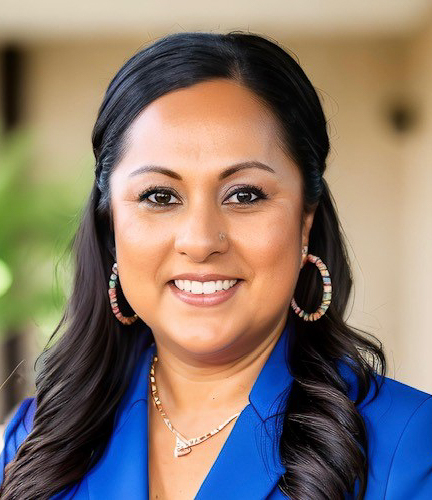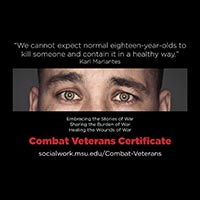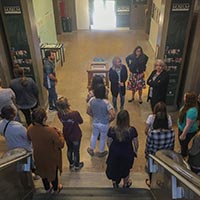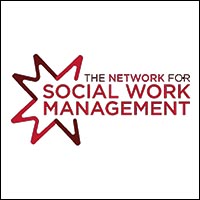Certificates, Scholars Programs, & Other Academic Opportunities
There are a number of ways to enhance your MSW education experience. Certificates, scholar programs, and other opportunities provide ways to deepen your knowledge and skill set with a particular population or setting. They are a way to package coursework and field placement work on your resume and to talk about your knowledge and skills with prospective employers. Some programs are open to all students while others are limited to students in either the Clinical or OCL advanced year. Please contact the coordinator listed for specific questions about these opportunities.
Certificates
-
Advocacy Scholars
It is with great pleasure that we announce Advocacy Scholars applications are now being accepted for the 2025-2026 academic year. Please see the application here. Applications are due on April 30, 2025.
Do you want to...
- Work in communities to help solve social problems?
- Advocate for rights, fair laws, and more just social policies?
- Contribute to efforts to help our most vulnerable citizens?
- Learn how to be an effective advocate for social change?
...then the MSU School of Social Work MSW ADVOCACY SCHOLARS Program is for you!
ADVOCACY SCHOLARS will:
- Receive a stipend award, which may renewable for a second year of study
- Complete an Advanced Practice Year field placement or Community Engaged Project focused on policy practice and advocacy skills development
- Participate in a seminar series led by policy advocacy leaders from diverse backgrounds
- Develop a poster-presentation style display to be featured at the Advocacy Day Event in March
- Have the opportunity to participate in a two-day bootcamp on how to run for political office
ADVOCACY SCHOLARS may also have the opportunity to:
Take advanced coursework in social activism and policy advocacy skills- Interact with social program and governmental officials
- Learn about the legislative decision-making process from a professional lobbyist
- Receive individualized mentoring on education and career development from faculty members with related experience
Apply Here for this exciting program, which will accept scholars to begin in August 2025. Applications to the Advocacy Scholars Program must be received by April 30, 2025.
If you have questions, please contact Mrs. Kelley Blanck at kblanck@msu.edu.
-
Research Scholars
The School of Social Work Research Scholars program is open to BASW and MSW students who are interested in expanding their education about social work research beyond the classroom. The Research Scholars program is a great opportunity for all social work students, but may be of particular interest to those who are wondering if they want to pursue a PhD in the future, are considering jobs that have significant research-related responsibilities, or are just curious about what real-world social work research looks like.
A call for applications goes out to students and faculty in late August with an early September due date. Students will be matched with Social Work faculty work on a variety of research projects.
Students are expected to work an average of 10 hours per week during Fall and Spring semesters. A limited number of stipends are available to support this work.
For more information: Contact Dr. Takisha LaShore, MSW Program Director, lashoret@msu.edu
2021/2022 Research Scholar projects
Youth Mental Health Literacy in Rural Areas and Youth Mental Health Website Development
Dr. Joanne Riebschleger
Erin Kramer, MSW student
Tess Bond, BASW student
Mireya Chavez, BASW studentCampus-wide Trauma Services and Training Network
Cheryl Williams-Hecksel
Bailey Akers, MSW studentPromoting Brain Health Knowledge Among Elders From Diverse Backgrounds
Dr. Fei Sun
Megan Bentley, MSW studentDiversity and inclusion in CSWE accredited schools of social work
Dr. Kyunghee Lee
Isabell Marchiselli, MSW student
Emma Johannes, BASW student
Lucinda Gleespan, BASW studentLiving Many Lives: A Life History Study of Black Women Living with Severe and Persistent Mental Illness
Dr. Marya Sosulski
Chey Davis, MSW studentThe Virtual Table: A Pilot Intervention to Assist Older Adults in Developing Technology Skills and Telehealth Patient Capacity
Dr. Paul Freddolino
Marie Huber, BASW studentIntimate Partner Violence Polyvictimization, Health Outcomes, and Help-Seeking among Minority Communities
Dr. Hyunkag Cho
Madison Boyle, BASW studentChallenges Negotiating the Care of Children and/or Elders and Employment Produced by the COVID-19 Pandemic
Dr. Anna Maria Santiago
Emily Cohen, BASW student
Noelle Rager, BASW student
Ava Fall, BASW studentDecision Making Processes Around Field Placements with Child Placing Agencies in CSWE-accredited MSW Programs
Dr. Sacha Klein
Jax Heil, MSW student -
Michigan Title IV-E Child Welfare Fellowship

Working in child welfare is an incredibly rewarding and meaningful experience. Every day, you have the opportunity to make a positive impact on the lives of children and families in need. Whether you're providing direct support, advocating for policy changes, or working behind the scenes to improve services, your work is vital to ensuring the safety, well-being, and future success of vulnerable children. It's a challenging field that requires compassion, resilience, and dedication, but the opportunity to be a part of positive change in the lives of children and families makes it all worthwhile!
The State of Michigan Title IV-E Child Welfare Fellowship is an opportunity to provide additional resources and support to students committed to working in the Child Welfare System - Children’s Protective Services, Foster Care, Licensing and Adoption. The aim of this program is to recruit, retain and educate students to be leaders in the field of child welfare. The fellowship includes requirements for course work and field education. Additionally, fellows will receive a stipend. Students will be contractually obligated to search for and accept employment in public, private, or tribal child welfare agencies in the State of Michigan upon graduation.
Click Here to Request More Information
Specialized Courses & Certificate Requirement
Michigan Title IV-E Child Welfare Fellows must complete the following course work and certificate requirement:
- Enroll, participate, and complete the Child Welfare Certificate endorsed by the Michigan Department of Health and Human Services
- SW 471 Child Welfare
- Required courses in human development (SW 811); and in social work practice, including content on cultural competency and anti-racist practice (SW 840 and SW 841)
- Enrollment in at least one elective course whose content is relevant to child welfare practice, such as diversity (view courses). Participation in at least two workshops on topics relevant to child welfare competencies
Program Requirements:
Michigan Title IV-E Child Welfare Fellows may be enrolled in full-time or part-time programs. Students must be U.S. citizens, U.S. permanent residents, DACA status or eligible noncitizens to participate in the fellowship.
Title IV-E fellows must agree to the following:
- Complete all necessary coursework and child welfare certificate requirement
- Complete their field placement at a public, private, or tribal child welfare agency in the State of Michigan
- Be employed in an approved position at a public, private, or tribal child welfare agency in the State of Michigan for the minimum payback period, upon graduation
Michigan Title IV-E Child Welfare Fellowship Funding
Regular program is 57 credits; Advanced Standing take a total of 36.
- 57 Credit MSW Students - $5000 per semester up to 4 semesters
- 36 Credit MSW Students - $5000 per semester up to 3 semesters
Application
Your MSW application must be completed by the school’s deadline. Admittance into the Michigan Title IV-E Fellowship will be contingent upon admission into the School of Social Work.
Apply for the Title IV-E Fellowship
 For more information about the Michigan Title IV-E Child Welfare Fellowship in the MSU School of Social Work, contact Child Welfare Program Coordinator, Elizabeth Montemayor at 517-432-4092 or montema7@msu.edu.
For more information about the Michigan Title IV-E Child Welfare Fellowship in the MSU School of Social Work, contact Child Welfare Program Coordinator, Elizabeth Montemayor at 517-432-4092 or montema7@msu.edu. -
Other Opportunities
Pathway to becoming a Certified Advanced Alcohol and Drugs Counselor (CAADC)
If you are planning to pursue the CAADC credential through the Michigan Certification Board for Addiction Professionals (MCBAP), some of your work in the MSW program can be counted toward the required education hours. Specifically:
- 186 education hours are required. 130 can be on-line, 50 need to be in-person, and 6 need to be behavioral health professional practice ethics, or MCBAP approved alternative.
- 180 of those 186 need to be “specific to substance use disorders”. That means the course title needs to include specific substance abuse language.
- Course work and field education in the MSW program can count toward education hours with 1 credit equating to 15 hours.
- Field education counting toward education hours can be at the undergraduate or the master’s level as long as it was completed within ten years of applying for the full CAADC.
- Field education counts toward in-person education hours.
- All experience hours must be completed post-MSW.
For complete information on CAADC requirements visit https://mcbap.com/caadc-certified-advanced-alcohol-and-drug-counselor/
Finland Study Abroad Program
International Social Policy and Social Service Delivery
Summer 2023
Contact: Amanda Woodward, awoodwar@msu.eduThis overseas blended model program is designed for graduate students in social work, health science policy/law, or related fields of study and is taught during the summer, with 2 of the 7 weeks spent abroad. Students will investigate areas of comparative and applied social policy, practice, and international social work in the context of Finnish social services provision in the classroom, online, and in Finland. Study will include history, economy, and government as it is relevant to understanding Finnish social policy development; trends and shifts in education and policy regarding social work especially as it is affected by the European Union and professional organizations; service provision to those who need physical and mental health care—either institutionally or in the community—from infants to elderly.
This program was introduced in the summer of 2011. In Finland this first year, students had exposure to a range of social service research groups, agencies, and professionals during their time in Helsinki and Tampere; students also experienced a day-trip to Tallinn, Estonia, and an overnight cruise and day in neighboring Stockholm, Sweden.








